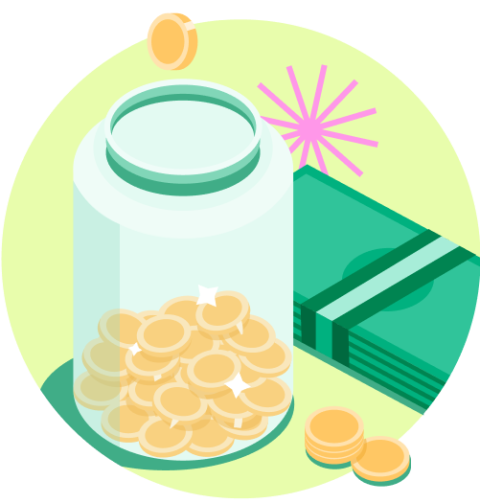
A bank statement is a monthly document that shows a summary of the money that goes in and out of your accounts. Check for errors, fees and any interest earned.
Updated May 10, 2022 · 1 min read Written by Margarette Burnette Senior Writer Margarette BurnetteMargarette Burnette is a NerdWallet authority on savings, who has been writing about bank accounts since before the Great Recession. Her work has been featured in The Associated Press , USA Today and other major newspapers. Before joining NerdWallet, Margarette was a freelance journalist with bylines in magazines such as Good Housekeeping, Black Enterprise and Parenting. She is based near Atlanta, Georgia.
Assigning Editor Yuliya Goldshteyn
Assigning Editor | Banking
Yuliya Goldshteyn is a former banking editor at NerdWallet. She previously worked as an editor, a writer and a research analyst in industries ranging from health care to market research. She earned a bachelor's degree in history from the University of California, Berkeley and a master's degree in social sciences from the University of Chicago, with a focus on Soviet cultural history. She is based in Portland, Oregon.
Fact Checked
Many, or all, of the products featured on this page are from our advertising partners who compensate us when you take certain actions on our website or click to take an action on their website. However, this does not influence our evaluations. Our opinions are our own. Here is a list of our partners and here's how we make money.
A bank statement is a monthly or quarterly document that summarizes your banking activity. It shows the money that went into and out of a bank account during the time period, or cycle. A statement can help you track finances, catch account mistakes and understand your spending habits.
If you have checking and savings accounts at the same financial institution, you might get information for all of them in the same report. While a statement period is usually one month long, it may not match up with the beginning of the calendar month. Your financial institution usually determines the cycle date [0]
Your deposits, the money received in your account, such as direct deposits, checks and electronic transfers.
Your withdrawals, the amount taken out of the account, such as purchases, sent electronic transfers and ATM cash withdrawals.
Any interest the account earned, noting the annual percentage yield, or APY, and dollar amount. Any fees charged by the bank, such as a monthly service charge. The ending account balance.» MORE: Want to avoid unnecessary fees? Find a no-fee account on NerdWallet’s list of top checking and savings accounts
Banks send statements at least monthly if your account uses electronic funds transfers [0]
. For example, if your bank lets you create an automated savings transfer from checking to savings, you can expect to receive a monthly statement. If EFT isn't offered, the bank may send statements quarterly instead of monthly.
Some banks charge a small fee for paper statements — typically around a dollar per report. If you have online banking, however, you usually have free access to electronic versions of your statements on the bank's website and mobile app.
Cash Management Money Market A savings account is a place where you can store money securely while earning interest. A savings account is a place where you can store money securely while earning interest. Learn MoreSoFi Checking and Savings
SoFi members with Direct Deposit or $5,000 or more in Qualifying Deposits during the 30-Day Evaluation Period can earn 4.50% annual percentage yield (APY) on savings balances (including Vaults) and 0.50% APY on checking balances. There is no minimum Direct Deposit amount required to qualify for the stated interest rate. Members without either Direct Deposit or Qualifying Deposits, during the 30-Day Evaluation Period will earn 1.20% APY on savings balances (including Vaults) and 0.50% APY on checking balances. Only SoFi members with direct deposit are eligible for other SoFi Plus benefits. Interest rates are variable and subject to change at any time. These rates are current as of 8/27/2024. There is no minimum balance requirement. Additional information can be found at http://www.sofi.com/legal/banking-rate-sheet.
Min. balance for APY Read reviewEverBank Performance℠ Savings
Min. balance for APY Learn MoreBarclays Tiered Savings Account
Min. balance for APYThese cash accounts combine services and features similar to checking, savings and/or investment accounts in one product. Cash management accounts are typically offered by non-bank financial institutions.
These cash accounts combine services and features similar to checking, savings and/or investment accounts in one product. Cash management accounts are typically offered by non-bank financial institutions.
Learn Moreon Wealthfront's website
Wealthfront Cash Account
Min. balance for APY Learn Moreon Betterment's website
Betterment Cash Reserve – Paid non-client promotion
*Current promotional rate; annual percentage yield (variable) is 5.50% as of 4/2/24, plus a .50% boost available as a special offer with qualifying deposit. Terms apply; if the base APY increases or decreases, you’ll get the .75% boost on the updated rate. Cash Reserve is only available to clients of Betterment LLC, which is not a bank; cash transfers to program banks conducted through clients’ brokerage accounts at Betterment Securities.
Min. balance for APYCDs (certificates of deposit) are a type of savings account with a fixed rate and term, and usually have higher interest rates than regular savings accounts.
CDs (certificates of deposit) are a type of savings account with a fixed rate and term, and usually have higher interest rates than regular savings accounts.
Read reviewMarcus by Goldman Sachs High-Yield CD
4.70% APY (annual percentage yield) as of 08/30/2024

Federally insured by NCUA
Alliant Credit Union Certificate



Annual Percentage Yield (APY) is accurate as of 09/10/2024

Discover® Cashback Debit


Chase Total Checking®

Deposits are FDIC Insured
Chime Checking Account
Monthly fee Money market accounts pay rates similar to savings accounts and have some checking features. Money market accounts pay rates similar to savings accounts and have some checking features.
Discover® Money Market Account

Once you get a new statement, aim to do these things:
This means matching your own record of deposits, withdrawals, interest and fees with the information on your bank statement. Reconciling can help you catch errors or even account fraud if there are unauthorized expenses. It can also help you keep track of your balance, which is key to avoiding overdraft fees .
If you notice charges on your bank statement you don’t remember making, or see transaction amounts you don’t think are accurate, take a few minutes to find the reason for the discrepancy.
It could be that you made a purchase you forgot about, or you recorded the wrong purchase amount in your budgeting app or spreadsheet. Review recent paper receipts or online confirmations to verify transactions. If you believe a transaction on your statement is in error, report it to your bank or credit union.
You’ll usually have up to 60 days from your statement date to dispute the error and correct the transaction.
After you review your statement, file it in a safe place. If you receive electronic statements only, consider downloading them. Some banks might limit access to statements after a few years, or you might choose to switch to another financial institution in the future.
You'll also probably need to refer to bank statements when you file your tax return , since they can help you confirm income and expenses. After you file your taxes, it is a good idea to keep your records for at least three years .
Bank statements help bank customers with their recordkeeping. The reports are a great tool to track your money and stay on the same page as your bank or credit union.
Get a new bank account - and $100 in rewardsBecome a Nerdwallet+ member, open an eligible bank account, and make a direct deposit within 45 days to start racking up rewards.
GET STARTED
You’re following Margarette Burnette
Visit your My NerdWallet Settings page to see all the writers you're following.
Margarette is a NerdWallet authority on savings. Her work has been featured in USA Today and The Associated Press. See full bio.
On a similar note.

Download the app

Disclaimer: NerdWallet strives to keep its information accurate and up to date. This information may be different than what you see when you visit a financial institution, service provider or specific product’s site. All financial products, shopping products and services are presented without warranty. When evaluating offers, please review the financial institution’s Terms and Conditions. Pre-qualified offers are not binding. If you find discrepancies with your credit score or information from your credit report, please contact TransUnion® directly.
NerdUp by NerdWallet credit card: NerdWallet is not a bank. Bank services provided by Evolve Bank & Trust, member FDIC. The NerdUp by NerdWallet Credit Card is issued by Evolve Bank & Trust pursuant to a license from MasterCard International Inc.
Impact on your credit may vary, as credit scores are independently determined by credit bureaus based on a number of factors including the financial decisions you make with other financial services organizations.
NerdWallet Compare, Inc. NMLS ID# 1617539
California: California Finance Lender loans arranged pursuant to Department of Financial Protection and Innovation Finance Lenders License #60DBO-74812
Insurance Services offered through NerdWallet Insurance Services, Inc. (CA resident license no.OK92033) Insurance Licenses
NerdWallet™ | 55 Hawthorne St. - 10th Floor, San Francisco, CA 94105